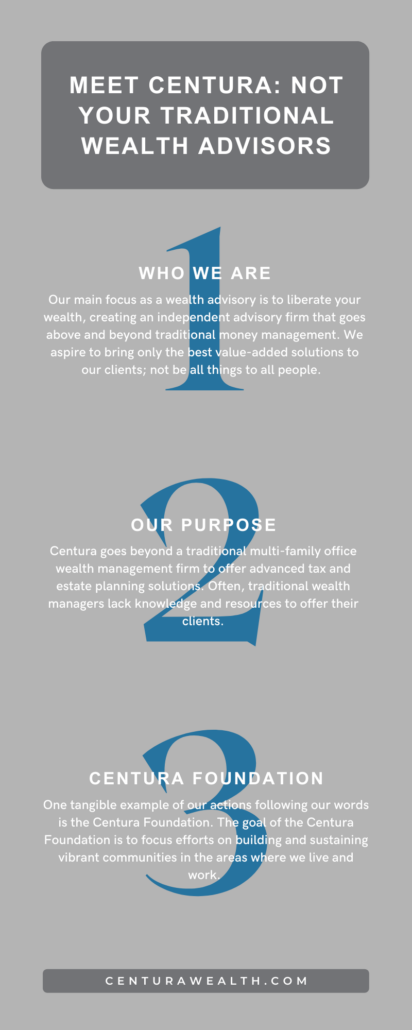If you’re new to financial planning, it can be difficult to know what questions to start with—even if you’re not new to planning, this is true. Here are five questions to ask your financial planner at your next meeting.
What is Your Wealth Advisory’s Philosophy?
If your personal philosophy aligns with your wealth advisor, chances are it’ll be a successful partnership.
For example, Centura Wealth Advisory believes in Liberating your Wealth® through many different avenues and passions. At the end of the day, finding an advisor that will understand you, and that you trust fully to navigate through the calm and stormy waters is important.
What’s Your Financial Planning Process?
It’s important to know what the plan is with your investments and wealth. Centura Wealth follows the Liberated Wealth Process®, but our process might look different than another advisory. As an example, our process follows these five steps:
Uncover
Holistic discovery by gathering and understanding data; the client’s purpose, path, and professional roster.
Unlock
The next phase is to follow a precise design by analyzing and triangulating existing strategies, establishing a baseline plan, considering “what if” scenarios, and identifying a planning scope.
Design
The design element is a core piece of the Liberated Wealth Process®. The design element includes a multi-phase action plan, a wealth scorecard, and charting new pathways.
Liberate
Understanding purposeful deployment. This includes implementation and advancement with plan implementation, coordinating professionals, portfolio implementation, and scorecard reporting.
Steward
The final step of the Liberated Wealth Process® is to monitor and pivot through purposeful deployment. This includes plan monitoring, timely recalibration, and life events reset.
This is one detailed explanation of what a process can look like to a client. It’s important to understand what the short and long-term goals are for your wealth management, and understanding your advisor’s process is the first step to completing those goals.
What is Your Company Culture Like?
You want to work with people you enjoy and who are going to go the extra mile to manage your wealth. Understanding their company culture can unlock what future meetings and communication will look like.
Centura Wealth likes to highlight creating energy in the workplace, but this is not everyone’s style. Hear from the Centura Wealth team as they provide an inside look at how the company culture looks like, “Seeking the Best: An Inside Look at Centura’s #1 Asset.”
Roby Kotcamp, Senior Wealth Advisor explains the culture. “One of the things that strikes you about Centura from an associate, employee, partner perspective, is that really there’s an embracing of people where they’re at. Real encouragement for people to be their authentic selves is valued.”
This is one example of a company culture that is founded on the goal of encouraging its’ own team and clients.
What is Your Client Retention Rate?
When you’re picking out a restaurant to eat at, where do you look first for input? Past customers write reviews and post photos that you’re likely to sift through before selecting.
Similarly, it can be helpful to ask about their client retention rate to gauge if they have a loyal clientele base.
How Much Will This Cost Me?
It’s important to ask about pricing upfront, so there are no surprise extra fees or costs along the way. Or, does the financial planning firm receive any compensation recommended for investments?
Since your financial planner is working with your money, it should be an initial conversation to avoid any miscommunications.
The terms ‘wealth manager’ and ‘financial advisor’ are often thrown around, but what are their differences? Learn more on our blog post, “Wealth Manager vs. Financial Advisor.”













